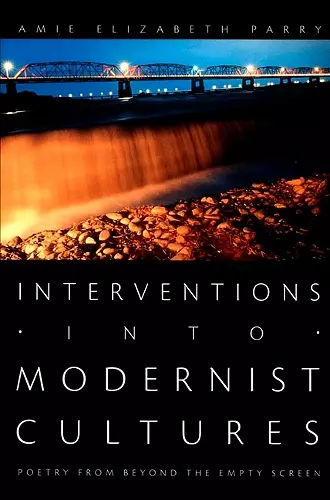Interventions into Modernist Cultures
Poetry from Beyond the Empty Screen
Format:Hardback
Publisher:Duke University Press
Published:30th Apr '07
Currently unavailable, and unfortunately no date known when it will be back

A comparative analysis of the cultural politics of modernist writing in Taiwan and the United States, as well as in immigrant Asian American writing
Presents a comparative analysis of the cultural politics of modernist writing in the United States and Taiwan. This title argues that the two sites of modernism are linked by their representation or suppression of histories of US imperialist expansion, Cold War neo-colonial military presence, and economic influence in Asia.Interventions into Modernist Cultures is a comparative analysis of the cultural politics of modernist writing in the United States and Taiwan. Amie Elizabeth Parry argues that the two sites of modernism are linked by their representation or suppression of histories of U.S. imperialist expansion, Cold War neocolonial military presence, and economic influence in Asia. Focusing on poetry, a genre often overlooked in postcolonial theory, she contends that the radically fragmented form of modernist poetic texts is particularly well suited to representing U.S. imperialism and neocolonial modernities.
Reading various works by U.S. expatriates Ezra Pound and Gertrude Stein, Parry compares the cultural politics of U.S. canonical modernism with alternative representations of temporality, hybridity, erasure, and sexuality in the work of the Taiwanese writers Yü Kwang-chung and Hsia Yü and the Asian American immigrant author Theresa Hak Kyung Cha. Juxtaposing poems by Pound and Yü Kwang-chung, Parry shows how Yü’s fragmented, ambivalent modernist form reveals the effects of neocolonialism while Pound denies and obscures U.S. imperialism in Asia, asserting a form of nondevelopmental universalism through both form and theme. Stein appropriates discourses of American modernity and identity to represent nonnormative desire and sexuality, and Parry contrasts this tendency with representations of sexuality in the contemporary experimental poetry of Hsia Yü. Finally, Parry highlights the different uses of modernist forms by Pound in his Cantos—which incorporate a multiplicity of decontextualized and ahistorical voices—and by Cha in her 1982 novel Dictee, a historicized, multilingual work. Parry’s sophisticated readings provide a useful critical framework for apprehending how “minor modernisms” illuminate the histories erased by certain canonical modernist texts.
“Bringing together American and Taiwanese literature in ingenious and innovative ways, Amie Elizabeth Parry insistently juxtaposes critical theories of modernity with postcolonial studies to argue that conceptions of the modern cannot be thought outside of the ‘ongoing transformations in and legacies of imperialism and colonialism.’”—David Eng, author of Racial Castration: Managing Masculinity in Asian America
“In this original and outstanding book, Amie Elizabeth Parry opens up new ways of reading and approaching U.S. and Asian modern literary cultures. Through her compelling and theoretically deft close readings of ‘minor’ modernists and experimental writers, modernist formations between the United States and East Asia are made to interact, comment on, and challenge the seemingly abstract or formalized claims of poetic innovation and geopolitical situation.”—Rob Wilson, coeditor of Global/Local: Cultural Production and the Transnational Imaginary
ISBN: 9780822338031
Dimensions: unknown
Weight: 426g
200 pages